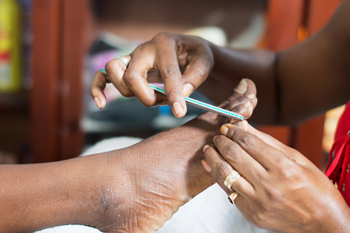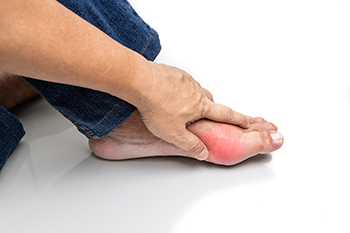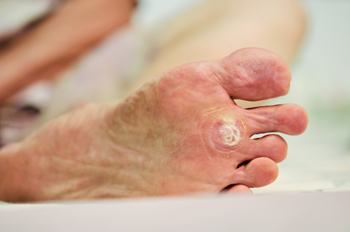

Many people connect that the quality of their life is based on how good their feet feel. They are the foundation of the body, and completing daily activities may be difficult with aching feet. Additionally, poor foot health may limit exercise completely, or limit the amount of time spent practicing it. There are simple habits that can ensure healthy feet when everyday foot care techniques are enforced. These start with washing and drying the feet thoroughly, followed by applying a good moisturizer on them. It is beneficial to have the toenails properly trimmed, and this can be done by having regular pedicures done, or by cutting them at home using a stainless steel clipper. The feet will feel good when they are soaked in warm water at the end of the day, which may have a soothing effect on the overall body. Additionally, the type of shoes that are worn contributes significantly to how the feet feel. It is beneficial to wear shoes that are the correct size, have ample room for the toes to move freely in, and are comfortable. If you would like to have additional tips on following a daily foot care routine, please confer with a podiatrist.
Everyday foot care is very important to prevent infection and other foot ailments. If you need your feet checked, contact the podiatrists from The Foot & Ankle Center of New Jersey. Our doctors can provide the care you need to keep you pain-free and on your feet.
Everyday Foot Care
Often, people take care of their bodies, face and hair more so than they do for their feet. But the feet are a very important aspect of our bodies, and one that we should pay more attention to. Without our feet, we would not be able to perform most daily tasks.
It is best to check your feet regularly to make sure there are no new bruises or cuts that you may not have noticed before. For dry feet, moisturizer can easily be a remedy and can be applied as often as necessary to the affected areas. Wearing shoes that fit well can also help you maintain good foot health, as well as making it easier to walk and do daily activities without the stress or pain of ill-fitting shoes, high heels, or even flip flops. Wearing clean socks with closed shoes is important to ensure that sweat and bacteria do not accumulate within the shoe. Clean socks help to prevent Athlete’s foot, fungi problems, bad odors, and can absorb sweat.
If you have any questions please feel free to contact our office located in Paramus, NJ . We offer the newest diagnostic and treatment technologies for all your foot and ankle needs.

In the first few years of a child’s life, the bones in their feet develop from soft areas of cartilage, known as growth plates. Once the growth plate fully develops, the bones do not grow any further. The heel bone grows until about the age of 15. A child between the ages of 9 and 15 who is physically active may develop a condition known as Sever’s disease. This is simply an imbalance between the growth of the heel bone and the soft tissue. The result is pain around the heel, which is made worse by running or standing on tiptoes. It is nearly impossible to detect Sever’s disease from an X-ray, but the symptoms usually are enough to make an accurate diagnosis. Relief from Sever’s disease comes from ceasing the activity that caused it and resting the foot. Heel pads and splinting at night can help to reduce the pain. For more information about Sever’s disease, please check with a podiatrist.
Sever's disease often occurs in children and teens. If your child is experiencing foot or ankle pain, see the podiatrists from The Foot & Ankle Center of New Jersey. Our doctors can treat your child’s foot and ankle needs.
Sever’s Disease
Sever’s disease is also known as calcaneal apophysitis, which is a medical condition that causes heel pain I none or both feet. The disease is known to affect children between the ages of 8 and 14.
Sever’s disease occurs when part of the child’s heel known as the growth plate (calcaneal epiphysis) is attached to the Achilles tendon. This area can suffer injury when the muscles and tendons of the growing foot do not keep pace with bone growth. Therefore, the constant pain which one experiences at the back of the heel will make the child unable to put any weight on the heel. The child is then forced to walk on their toes.
Symptoms
Acute pain – Pain associated with Sever’s disease is usually felt in the heel when the child engages in physical activity such as walking, jumping and or running.
Highly active – Children who are very active are among the most susceptible in experiencing Sever’s disease, because of the stress and tension placed on their feet.
If you have any questions, please feel free to contact our office located in Paramus, NJ . We offer the newest diagnostic and treatment technologies for all your foot and ankle injuries.

People who experience gout attacks often find completing daily tasks difficult to do. This is a result of the severe pain and discomfort gout can cause, and many people often seek prompt medical attention. It can occur from genetic reasons, or from eating foods that have high levels of purines like red meat, shellfish, and alcoholic drinks. Purines cause excess uric acid to lodge between the joints in the big toe which can be likened to a sensation of crystals that is felt in the toes. This feeling can produce severe pain and discomfort, and daily activities are often ceased until it subsides. Gout may target specific groups of people, including men over 40 years old, overweight people, or possibly those having kidney disease. Effective prevention techniques can consist of reducing the amount of alcohol that is consumed, drinking plenty of water, and generally eating healthy foods. If you have frequent gout attacks, it is strongly urged that you are under the care of a podiatrist who can determine what the reason is, and offer you the correct treatment options.
Gout is a painful condition that can be treated. If you are seeking treatment, contact the podiatrists from The Foot & Ankle Center of New Jersey. Our doctors will treat your foot and ankle needs.
What Is Gout?
Gout is a form of arthritis that is characterized by sudden, severe attacks of pain, redness, and tenderness in the joints. The condition usually affects the joint at the base of the big toe. A gout attack can occur at any random time, such as the middle of the night while you are asleep.
Symptoms
Risk Factors
Prior to visiting your podiatrist to receive treatment for gout, there are a few things you should do beforehand. If you have gout you should write down your symptoms--including when they started and how often you experience them, important medical information you may have, and any questions you may have. Writing down these three things will help your podiatrist in assessing your specific situation so that he or she may provide the best route of treatment for you.
If you have any questions, please feel free to contact our office located in Paramus, NJ . We offer the newest diagnostic and treatment technologies for all your foot care needs.

A plantar wart, also called a verruca, is believed to be caused by the human papillomavirus (HPV) and results in the buildup of keratin on the skin. This shows up as a wart. Because HPV thrives in warm, moist environments, it may be spread by walking barefoot around swimming pools or gym locker rooms. It frequently enters through a crack or sore on the bottom of the foot. Plantar warts often cause pain, which can be felt when putting weight on the foot. Other symptoms include thickened skin that appears to be a callus and black dots, which are actually dried blood trapped in the capillaries. Sometimes, white or skin-colored lesions appear on the sole of the foot. Plantar warts often go away on their own, but the foot may be re-exposed if proper footwear is not used in situations where HPV is likely to be found. A podiatrist can offer a number of treatment options to remove a plantar wart. Among them are burning off the wart with salicylic acid, freezing the wart, or cutting the wart out. For more information, please consult a podiatrist.
Plantar warts can be very uncomfortable. If you need your feet checked, contact the podiatrists from The Foot & Ankle Center of New Jersey. Our doctors will assist you with all of your foot and ankle needs.
About Plantar Warts
Plantar warts are the result of HPV, or human papillomavirus, getting into open wounds on the feet. They are mostly found on the heels or balls of the feet.
While plantar warts are generally harmless, those experiencing excessive pain or those suffering from diabetes or a compromised immune system require immediate medical care. Plantar warts are easily diagnosed, usually through scraping off a bit of rough skin or by getting a biopsy.
Symptoms
Treatment
To help prevent developing plantar warts, avoid walking barefoot over abrasive surfaces that can cause cuts or wounds for HPV to get into. Avoiding direct contact with other warts, as well as not picking or rubbing existing warts, can help prevent the further spread of plantar warts. However, if you think you have developed plantar warts, speak to your podiatrist. He or she can diagnose the warts on your feet and recommend the appropriate treatment options.
If you have any questions please feel free to contact our office located in Paramus, NJ . We offer the newest diagnostic and treatment technologies for all your foot and ankle needs.

As winter approaches, it can bring with it an increase in pain and inflammation in people with arthritis. This is believed to be caused by changes in barometric pressure rather than by cold and damp climates. When the barometer is up, the pressure pushes against the body and keeps tissues from expanding. The opposite is true when the barometer drops. The lower pressure allows the tissues to expand and they in turn put pressure on the nerves that transmit feelings of pain. This explains why many people with arthritis say they can predict a storm. They feel the pain as the barometer drops. Physical activity can help to reduce joint pain and increase flexibility. Experts suggest keeping active during colder months by walking indoors and wearing looser layers of clothing to trap body heat. Wearing socks and waterproof boots are recommended if you are outdoors. See a podiatrist for further information on how to manage your arthritis pain.
Arthritis can be a difficult condition to live with. If you are seeking treatment, contact the podiatrists from The Foot & Ankle Center of New Jersey. Our doctors can provide the care you need to keep you pain-free and on your feet.
Arthritic Foot Care
Arthritis is a term that is commonly used to describe joint pain. The condition itself can occur to anyone of any age, race, or gender, and there are over 100 types of it. Nevertheless, arthritis is more commonly found in women compared to men, and it is also more prevalent in those who are overweight. The causes of arthritis vary depending on which type of arthritis you have. Osteoarthritis for example, is often caused by injury, while rheumatoid arthritis is caused by a misdirected immune system.
Symptoms
Arthritic symptoms range in severity, and they may come and go. Some symptoms stay the same for several years but could potentially get worse with time. Severe cases of arthritis can prevent its sufferers from performing daily activities and make walking difficult.
Risk Factors
If you suspect your arthritis is affecting your feet, it is crucial that you see a podiatrist immediately. Your doctor will be able to address your specific case and help you decide which treatment method is best for you.
If you have any questions, please feel free to contact our office located in Paramus, NJ . We offer the newest diagnostic and treatment technologies for all your foot care needs.